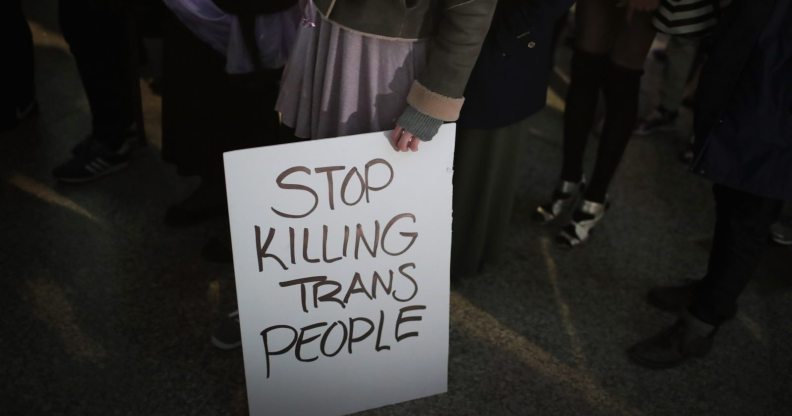Police aren’t respecting the names of transgender murder victims – and it may prevent justice

A candlelight vigil in Chicago. (Scott Olson/Getty)
Police across the US are overwhelmingly using the birth names of transgender murder victims, it has been revealed.
Transgender women, and specifically trans women of colour, are one of the demographics most at risk of being murdered in the US.
Despite the frequency with which they are killed, their deaths are often handled in an insensitive and transphobic way by police.

A member of the transgender community demands justice after the murder 2016 murder of Paola Ledezma (YURI CORTEZ/AFP/Getty)
An investigation by ProPublica has found that transgender victims are still commonly referred to by their deadnames in the vast majority of cases.
The outlet reviewed the murders of 85 transgender people since January 2015, finding that in 74 of the cases, the victims were identified by their former names or birth genders.
Many forces insisted on using the name or gender listed on the victim’s ID, even when it is several years out of date.
Campaigners say that deadnaming transgender people can cause significant harm to police investigations during the most critical phase, because people with information may only know the victim by their chosen name, and because deadnaming fosters mistrust of police within the transgender community and the victim’s social circle.
Detective Orlando Martinez of the Los Angeles Police Department agreed: “That might lose the cooperation of the friends and family — the people we need to solve the case.”

(Stock photo)
In Jacksonville, Florida, a spate of murders of transgender women has seen relations between the community and police force break down significantly – with the repeated deadnaming of victims a point of tension.
Since February, four transgender women of colour have been gunned down in the city. Three victims died, while the fourth victim was shot five times but survived
Police continue to deny there is any link between the killings, but trans campaigners say police’s treatment of victims “creates an unwillingness by others in the community to step forward.”
Gina Duncan, Equality Florida’s Director of Transgender Equality and Chair of TransAction Florida, said: “The transgender community in Jacksonville is frightened. They fear this could be a serial killer or orchestrated violence targeting the community. They do not feel protected on their own streets.
“By misgendering these transgender women, the Jacksonville Sheriff’s Office disrespects their memory and impedes their own investigations.
“These are out, trans women and that is how they are known in the community.”
There has been some progress, as the Jacksonville Sheriff’s Office has admitted “insensitive” handling of the deaths.

(Stock photo)
Meanwhile, in Orange County, Florida, the Sheriff issued an apology for misgendering a murder victim.
Sheriff Jerry Demings said: “The Orange County Sheriff’s Office did not intend to be insensitive in this effort and I along with agency members apologize for any misgivings our communications may have caused.
“As Sheriff, I am proud to report that the Orange County Sheriff’s Office continues to have a positive relationship and open dialogue with members of the LGBTQ community, and we will seek additional measures to further strengthen that bond in the days ahead.”
Gina Duncan continued: “All across the nation, law enforcement agencies have adopted protocols for responding to anti-transgender violence.
“They recognise that respecting the community builds trust and creates a willingness to share information that may catch a killer.”
ProPublica’s research highlighted the real possibility that shoddy handling of trans murder cases may actually lead to killers escaping justice.
The survey found that arrests have been made in 55 percent of the murders, lower than the overall clearance rate for murders in the US, which is 59 percent.

